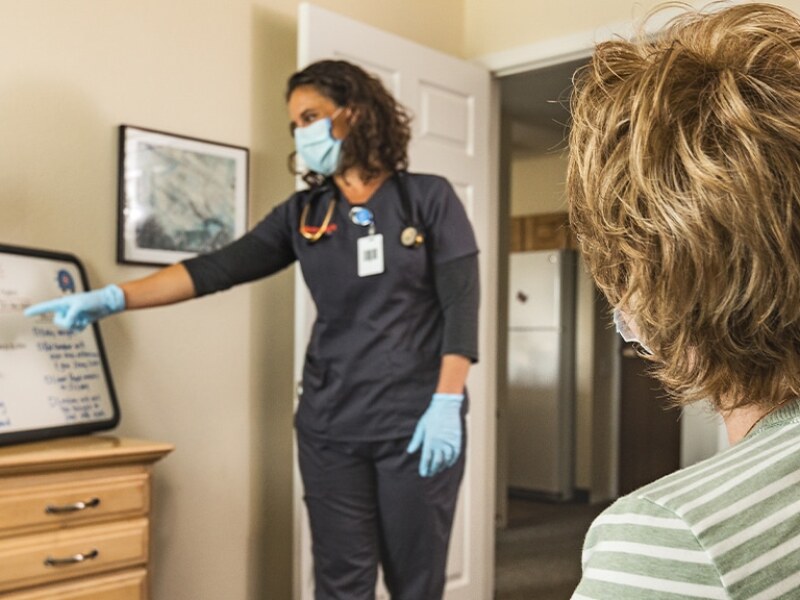Original content as featured in Becker’s Healthcare
The global pandemic brought a tsunami of logistical complications for hospitals and health systems. And while the height of
COVID-19’s most suffocating waters is retracting, several pre-pandemic looming issues remain even further exposed. Nevertheless, being agile and proactive in this new era is how we will achieve success. Several forward-thinking health systems are seeing notable results by partnering to bring the hospital’s power to their patients at home. And in the process, they realize life context is a powerful vital sign.
For months, 61-year-old Shirley (a pseudonym for her real name) had been in and out of multiple hospitals, never fully recovering from the illnesses resulting in repetitive episodes of acute care - she was disengaged from her health by appearance. Efforts to understand the root cause surrounding Shirley’s pattern of frequent falls, emergency room visits, and hospitalizations, had been exhausted. Realizing she needed something more, her case manager’s next move, which ultimately saved Shirley’s life, was to engage DispatchHealth’s transitional care team. These are proactive home-based medical interventions 24- to 72-hours after a hospital discharge designed to support a patient’s return home.

Right from the start, several previously unknown issues surfaced. The DispatchHealth clinical team recognized a need for medication reconciliation and furniture rearrangement to enable safer movement throughout the home. They brought her a wheelchair and toilet riser, and when it became clear that the walker provided by the hospital didn’t fit through her bathroom door, which caused a previous fall, our team ordered one that fit. While all these corrections were essential, she remained unwell; why?
The pieces finally came together on the fourth day of her treatment course. Learning Shirley had missed another scheduled MRI appointment, the physician managing her care made a house call and found his patient dizzy, tired, and urgently needing IV fluids. Her son mentioned how warm the room was, explicitly noting the furnace on his mom’s wall and saying it ran all the time. At that moment, her physician figured it out - Shirley’s wall was stained black from the forced air, and her symptoms were consistent with someone suffering from carbon monoxide poisoning. Blood work confirmed Shirley’s months-long pattern of frequenting the emergency room, several hospitalizations, and missed appointments was the result of chronic carbon monoxide poisoning. Her failure to thrive resulted from an unrecognized, chronic exposure to the deadly gas. Something only a provider in the home, examining his patient’s environment, could realize.
Within 30 days of hospital discharge, one in five elderly patients gets readmitted. It’s a significant, costly, and complex problem plaguing our healthcare ecosystem. However, by infusing traditional medicine with a focus on social determinants of health and care guided by insights found in a patient’s home, fewer emergency room visits, hospital admissions, and readmissions are possible. For example, one of DispatchHealth’s earliest partners, a health system in the northeast, reported a 50% reduction in 30-day readmission with unprecedented patient satisfaction with significant medical cost savings.
DispatchHealth’s Chief Medical Officer, Dr. Phil Mitchell, shared, “Our presence in patients’ homes provides a unique opportunity to change the trajectory of their wellbeing. We not only saved Shirley’s life but provided a new perspective as to why her health was declining so drastically. In addition, we worked in close coordination with her primary care physician, her insurance company’s case management group, and the hospital team. Shirley’s success story demonstrates the power of home-context and 360-degree collaboration.”
The pandemic illuminated the need to create a distributed healthcare delivery ecosystem centered in patients’ homes; home is where we can address socioeconomic issues and other barriers to health. And while the explosive growth in telemedicine is significant, providers physically engaging with patients in their environment is what it will take to shift the tide. In 2022, healthcare finds itself at a crossroads - do we revert to the pre-pandemic system, expecting patients to navigate fragmented, traditional brick and mortar interactions? Or build on the momentum gained during the last two years and dive even deeper to capitalize on the vital intelligence gained in the home?

Mark Prather, MD, MBA is CEO and Co-Founder. DispatchHealth is the nation’s first comprehensive in-home medical care provider with services ranging from same-day, high-acuity care to a 30-day alternative to a hospital stay, all delivered straight to the patient’s door. Including mobile diagnostics, DispatchHealth is delivering care to patients in 57 markets across the country and growing.











